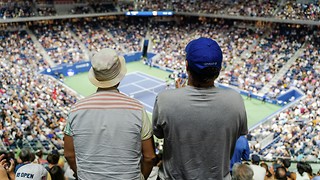TV: Best of Enemies
‘A brilliant hour-and-a-half documentary’

When William F. Buckley, Jr., the doyen of the American right-wing movement, agreed to be the ABC network’s conservative debater and commentator for the 1968 national conventions, he was asked with whom he would not go on screen. He replied that he would refuse to go on with a communist, and, apart from that, Gore Vidal. So it was a coup for the flailing network – an old joke said that the way to end the Vietnam War was to put it on ABC: it would get cancelled in thirteen weeks — when Buckley and Vidal did appear together in front of their cameras.
They were diametrically opposed intellectuals who each hated absolutely everything about the other. Vidal, the provocative left-wing author and politico, was to Buckley the devil, whose liberal views on subjects like sex and civil rights would be the country’s ruination. To many progressive people in America, however, he was a refreshing and adored iconoclast. To Vidal, Buckley was a reactionary and a bigot who, at his most extreme, represented a threat to democracy. Yet to those on the right he was the St Paul of their movement. In the words of his brother, he was a right-wing libertarian Christian, but, most of all, a revolutionary. Any debate between these two would always be about more than politics, it would be about who was the better person.
Best of Enemies, a brilliant hour-and-a-half documentary about those debates, has recently come to UK Netflix. Written and directed by Robert Gordon and Morgan Neville (also director of Twenty Feet from Stardom), it takes a fascinating look at what can at once be seen as the golden age of the public intellectual and the birth of antagonistic pundit TV. The film makes for brilliantly entertaining viewing: even while waiting for the boxing match-like on air bell to ring, their mutual hatred is palpable. But it is when the cameras start rolling and the debates begin that the viewers are treated to all of Buckley and Vidal’s eloquence, intellect and acerbic wit.
The first debate is on the 1968 Republican Convention at which Richard Nixon and Ronald Reagan vied for the presidential nomination. The two go after each other on various issues, such as the Vietnam War, in footage that relays the division and political climate in America at the time. While dissecting each other’s arguments in their meticulous Long Island drawls, Buckley and Vidal trade ad hominem barbs. Vidal is the superior in this regard. To him Buckley is “always to the right and almost always in the wrong.” Clips of people who knew the two men, such as Buckley’s biographer Sam Tanenhaus and Vidal’s dauphin Christopher Hitchens, pepper the film, giving insight into their off-screen characters.
The antipathy between the pair snowballs until, in a beautiful moment of climactic cinema, the barely concealed loathing is allowed to burn in the open. During the debate on the Democratic Convention Vidal calls Buckley a “crypto-Nazi”, at which moment Buckley’s cool perceptibly fractures. His jaw trembling with rage, he calls Vidal a “queer”, leans towards him and delivers a threat: “I’ll sock you in your goddamn face, and you’ll stay plastered.” Vidal grins, knowing he has won. For the rest of his life Buckley, the calm and composed Yale man so revered in political circles, later to be the height of fashion in Reaganite America, would regret that moment. The film follows the moment’s fascinating fallout.
Every good university student knows how to find a tenuous link between their studies and current affairs, but here it hardly needs elucidating. The America of 1968, a country seemingly about to burst at the seams, mirrors almost perfectly the America of today — yet then it was anti-Black rather than anti-Muslim hysteria consuming much of country. For the Republican Party of the 1960s, hateful views on the Civil Rights movement were dressed up as concerns about law and order. Donald Trump and his odious views on Islam and immigration are comparable to the bile that those on the fringes, and even those at the centre, of the American right were producing in 1968. Paranoia and division were then, as today, the norm, and politicians like the Trump-esque Barry Goldwater were profiting because of it. Its focus on the media also makes Best of Enemies exceptionally relevant in 2016. It suggests that the gladiatorial style of punditry the Buckley vs. Vidal debates initiated stokes societal divisions, and was the forebear of contemporary vapid punching matches like Fox News’ political coverage. However it is also nostalgic, looking back to a time when two great intellects of opposing views could discuss and inform in an entertaining format. This excellent and enthralling documentary captures an intellectual environment that our political commentary today is the poorer without.
 Features / The community Cambridge accommodation creates (and doesn’t)9 August 2025
Features / The community Cambridge accommodation creates (and doesn’t)9 August 2025 News / Trinity sells O2 Arena lease for £90m12 August 2025
News / Trinity sells O2 Arena lease for £90m12 August 2025 Lifestyle / An ode to college accommodation11 August 2025
Lifestyle / An ode to college accommodation11 August 2025 Sport / ‘A full-time job with overtime’: should disparities change the way we approach Bumps?6 August 2025
Sport / ‘A full-time job with overtime’: should disparities change the way we approach Bumps?6 August 2025 Features / Incoming freshers and their hopes, fears and expectations for Cambridge 12 August 2025
Features / Incoming freshers and their hopes, fears and expectations for Cambridge 12 August 2025









